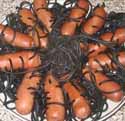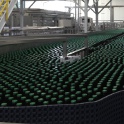|
Jo3sh posted:This concerns me a bit. The thing is that carbonation is not really dependent on a fixed gravity at bottling - it's dependent on the amount of sugar you add, or put another way, the delta between your FG and your bottling gravity. See, that's what I thought too. It made no sense to me to bring the SG to a specific target since it could vary wildly when fermentation stopped, and by additives (other than sugar) after the fact. Xylosweet is a brand name of Xylitol, an alcohol sugar, and therefore non-fermentable. I added 14 tbsp. and I can't remember the density, but I want to say it was around 1.000. I know I didn't add anywhere near 10 points worth of sugar, but I DO know that I added a little less than 1/2c. dissolved sugar per gallon to get it to 1.005. I hope that sounds a bit safer. I have all my measurements written down at home and I can't recall the exact quantities.
|
|
|
|

|
| # ? Apr 24, 2024 14:50 |
|
Prefect Six posted:Alright, so I'm done with brewing beer in the winter until I can get a dual-stage set up. It's too cold in the garage so I put the pale ale I brewed in the coldest spot in the house (which we keep at 68F in the winter), our master closet, and it's bubbling away at loving 76F. The other closets are too small and both bathrooms have windows where direct sunlight would hit the beer. I'm going to end up with another estery mess of a beer that I was really excited about making. I'm glad to know that my friend and I invested $200 into a fermenting room and it won't be in vain. Sorry to hear about this. We're taking a spare room he has next to his room and are making it climate controlled to ensure this doesn't happen. As for the carboy, I think the kit I'm getting has a better bottle carboy, so that's essentially a clear/better than plastic, yes?
|
|
|
|
Super Rad posted:How old is your beer? Are you carbing in bottles? I've noticed a lot of the greener flavors as well as some of the bitterness will start to subside once your beer has been carbonated and then chilled for a few weeks - if you've been letting them self carb and then cooling them on demand that may explain why those green grassy flavors aren't going away - refrigerate them longer. Right on. I will give that a try.
|
|
|
|
Prefect Six posted:Does the BJCP hate Mosher? drat Mosher and his not being overly concerned about fitting into a specific style by necessity!
|
|
|
|
That's something like a pound of sugar in five gallons. Probably not safe  greasy digits posted:See, that's what I thought too. It made no sense to me to bring the SG to a specific target since it could vary wildly when fermentation stopped, and by additives (other than sugar) after the fact. Xylosweet is a brand name of Xylitol, an alcohol sugar, and therefore non-fermentable. I added 14 tbsp. and I can't remember the density, but I want to say it was around 1.000. I know I didn't add anywhere near 10 points worth of sugar, but I DO know that I added a little less than 1/2c. dissolved sugar per gallon to get it to 1.005. I hope that sounds a bit safer. I have all my measurements written down at home and I can't recall the exact quantities.
|
|
|
|
greasy digits posted:I know I didn't add anywhere near 10 points worth of sugar, but I DO know that I added a little less than 1/2c. dissolved sugar per gallon to get it to 1.005. So let's say for the sake of discussion you added 3/8 cup of white sugar per gallon. That's actually a whole lot - in five gallons (which I think you said was your batch), that's 15/8, or close to two cups for the batch. Most priming calculators suggest less than six ounces of table sugar in five gallons even for effervescent styles, but nearly two cups of sugar is almost a pound. I'm still concerned. If those have been bottled more than a few days, I would probably get them chilled as cold as possible as soon as possible and check to see if they are getting overcarbonated. It's still possible you have bottle bombs brewing.
|
|
|
|
Docjowles posted:Basically it's that plastic carboys have all the same advantages and none of the disadvantages. I think they are a different type of plastic and therefore have much less O2 permeability but I could be misremembering. Just to be I don't mind my glass carboy, but I just buy more buckets cause they're cheap and easy. edit: I forgot my own research. SoftNum fucked around with this message at 18:11 on Dec 13, 2011 |
|
|
|
Darth Goku Jr posted:drat Mosher and his not being overly concerned about fitting into a specific style by necessity! I was thinking more along the lines of Tasting Beer which I think would be an excellent companion for any beer judge.
|
|
|
|
TenjouUtena posted:Just to be I think the danger of O2 ingress is overstated anyway. A lot of really good breweries ferment in open troughs - Anchor specifically uses a shallow, wide geometry which would maximize surface area, and Sierra Nevada's Bigfoot (and maybe all of their beers, but I don't know for sure), which keeps very nicely, is also fermented open. http://www.sierranevada.com/beers/images/bigfootsmall.mov ^^^ Sorry, Quicktime file, I have no idea what those guys are thinking. Jo3sh fucked around with this message at 18:30 on Dec 13, 2011 |
|
|
|
I think part of the deal is in a closed fermenter, once the heat of fermentation is over and the beer cools off, the gas in the headspace contracts and even a small difference in pressure can suck in oxygen. It probably isn't anywhere near a big a deal as oxygen introduction at every other point in the process, though.
|
|
|
|
alright, this beer I'm making, which is pretty much the heaviest OG beer I've ever done (1.097 I think) has sort of plateaued at 1.029. it was there when I racked it from primary to secondary, and I added fruit in secondary. fermentation took off like a rocket so I thought it would keep on falling, but I just racked it to a keg (tertiary?) and it's still at 1.029 - I'm on day 16. could the alcohol level be inhibiting the yeast? surely not, or fermentation wouldn't have started up again when I added more sugar. Is it likely if I just leave it sitting in the keg at around 65deg that it will slowly attenuate? the beer just tastes young as poo poo, and definitely needs more time.
|
|
|
|
My secret santa 6-pack is officially on it's way to one of you goons. I'm excited to see(taste) what I get!
|
|
|
|
mindphlux posted:alright, this beer I'm making, which is pretty much the heaviest OG beer I've ever done (1.097 I think) has sort of plateaued at 1.029. Gonna need more details like recipe, mash temp, fermentation temp, how much yeast you pitched, how well you oxygenated etc. But you got 70% attenuation which isn't terrible on a beer that big. You need to start using tricks like mashing real low and subbing out 10-20% of the grist for simple sugars to get a monster beer to still finish out dry. You could always pitch brett and/or some bacteria. It would take things in a totally different direction but they give no fucks and will eat that down to near 1.000 given long enough. Edit: or wait, is this the sour beer you decided not to sour already? 
|
|
|
|
Docjowles posted:Gonna need more details like recipe, mash temp, fermentation temp, how much yeast you pitched, how well you oxygenated etc. But you got 70% attenuation which isn't terrible on a beer that big. You need to start using tricks like mashing real low and subbing out 10-20% of the grist for simple sugars to get a monster beer to still finish out dry. yes this is that one  maybe the world is just crying out at me to make it sour. except now its in a keg, and I don't want to occupy my keg for a year. :/ maybe the world is just crying out at me to make it sour. except now its in a keg, and I don't want to occupy my keg for a year. :/I posted the recipe earlier, 14lb pils, 2lb white wheat 2lb 80l crystal. mash as follows : 122 30 min rest 149 30 min rest 158 30 min rest 167 mash out sparge with 176C yeast was just a packet of danstar nottingham, I wasnt worried too much about that because I was originally planning on pitchin brett. oxygen was just splashing vigorously into the bucket, all I ever do.
|
|
|
|
mindphlux posted:yeast was just a packet of danstar nottingham why... what... why...
|
|
|
|
Not sure if this is the best place to ask this but I figure here or the beer geek thread was the best: Have any of you gone through the American Brewers Guild Craftbrewers Apprenticeship program? Did you find it worthwhile? Did they help find you a job afterwards? Would you do it all over again if you had the chance? I was informed that I can move up on the waitlist and start in a few weeks (!!) and all the questions I was planning on working out about it have suddenly become very relevant. Thanks!
|
|
|
|
Here's a sort of wacky idea I've had about the problems of step mashing in a cooler. Since you have to start with such a low water to grist ratio to even squeeze in two temperature steps, why not heat the runnings? Like... drain the tun, heat the runnings to the next step temp plus a few degrees, place back in the tun and get a temp reading, add more heated water to adjust as needed? Seems overly complicated at first, but with a decent calculator on hand it seems doable. Thoughts?
|
|
|
|
mewse posted:why... what... why... ugh I thought I had a safale 05 at home, so I didn't buy one, and didn't discover my mistake until it was yeast pitching time. I was like 'gently caress' and just pitched what I had, figuring I'd add other yeast in like a day, which never happened. I'm just as disappointed in myself / this beer as you probably are, I assure you...
|
|
|
|
beetlo posted:Like... drain the tun, heat the runnings to the next step temp plus a few degrees, place back in the tun and get a temp reading, add more heated water to adjust as needed? Seems overly complicated at first, but with a decent calculator on hand it seems doable. Thoughts? Seems like RIMS or HERMS would be easier and more effective.
|
|
|
|
Jo3sh posted:Seems like RIMS or HERMS would be easier and more effective. And much more expensive.
|
|
|
|
beetlo posted:And much more expensive. Basically what you've described is the inverse of a deoction mash. You're heating the liquor rather than the thick part of the mash, and it doesn't sound like you want to boil it, but overall it seems like it would work. Still sounds like a pain to me, though. Since RIMS and HERMS do require outlay, I'd think decoction would be the thing to do, only requiring an extra pot.
|
|
|
|
mindphlux posted:yes this is that one Grow up a starter of liquid yeast, swirl around the carboy or bucket and pitch active, healthy yeast in it and it should be fine. Warm it up to 68 or so if you can as well.
|
|
|
|
Doc_Uzuki posted:Have any of you gone through the American Brewers Guild Craftbrewers Apprenticeship program? Did you find it worthwhile? Did they help find you a job afterwards? Would you do it all over again if you had the chance? I haven't gone through it but two people I've worked with have. One of them was a guy on the bottling line with me when I started my job. He was doing the course while he worked, and he went and did his apprenticeship at a brewpub in Oregon. He didn't make it past his probationary period at my work while the course was going on, so he probably wasn't the greatest worker. I don't know, I only worked with him for a few weeks. He came back from his apprenticeship and started making plans to open his own brewery but that hasn't gone anywhere as far as I know. I don't know if he actually applied to get a job at any other breweries or if he's still going to try and open his own. The other guy did his apprenticeship at my work and he's currently 1 of our 3 brewers. He has talked highly about the course. Again I don't know how much they helped him with job placement since he got hired where he did his apprenticeship. He seems to do a good job and I've never heard anybody say otherwise, so knowledge-wise it seems like it would be a good program.
|
|
|
|
Hypnolobster posted:Grow up a starter of liquid yeast, swirl around the carboy or bucket and pitch active, healthy yeast in it and it should be fine. Warm it up to 68 or so if you can as well.
|
|
|
|
Jo3sh posted:So let's say for the sake of discussion you added 3/8 cup of white sugar per gallon. That's actually a whole lot - in five gallons (which I think you said was your batch), that's 15/8, or close to two cups for the batch. Most priming calculators suggest less than six ounces of table sugar in five gallons even for effervescent styles, but nearly two cups of sugar is almost a pound. Hmm, I'm going to have to check my measurements when I get home. I could've been completely off when I said I added 1/2 c. per gallon. I was following the sacred tome Winemaker's Recipe Handbook by Raymond Massacesi, and from what I'm seeing on my digital copy, recommends 1/4 c. per gallon. It's making the assumption that your brew ends up right at 1.000 when fermentation is complete (which I believe is what mine was after adding the Xylitol) and adds that you can bottle it in "returnable pop bottles" as well as champagne bottles, so apparently the author isn't anticipating crazy pressure. Still, I'll double check everything as soon as I get home, keep a close eye on my brew, and cold crash it if it starts to get dodgy. I appreciate the help and advice from everyone and so far it's been a fun learning experience.
|
|
|
|
My first all-grain is almost done- Popped open a bottle a couple days ahead of schedule and the final results are drinkable! One question though; the hops are a little more bitter than I'm used to. Will letting the beer (black IPA) sit for longer or serving it at a little colder than room temp make much of a difference? GonadTheBallbarian fucked around with this message at 00:15 on Dec 14, 2011 |
|
|
|
GonadTheBallbarian posted:One question though; the hops are a little more bitter than I'm used to. Will letting them sit for longer or serving it at a little colder than room temp make much of a difference? Yeah, beer loses bitterness (and hop flavor and aroma, too) over time. Even just another month should make a noticeable difference.
|
|
|
|
Docjowles posted:Yeah, beer loses bitterness (and hop flavor and aroma, too) over time. Even just another month should make a noticeable difference. With my roommates, it's unlikely that it'll survive a month, but good to know!
|
|
|
|
GonadTheBallbarian posted:My first all-grain is almost done- Depending on your recipe, the perceived extra bitterness could be a result of any roasted malt you used, which can add a dry sharp roasty bitterness. That will drop out over time, too, as the tiny roasted particles settle out of the beer.
|
|
|
|
Hey Saq, I was using your yeast spreadsheet and it looks like your entry for WY3068 is slightly off. Yours says the temperature range is 68-72 and the WY website says 64-72. I hope it's actually lower than that, because I'm fermenting this weizenbock at 62*. Not a big deal, but I figured I'd mention it.
|
|
|
|
Sent my secret Santa off today!
|
|
|
|
My friend wants to go straight to all-grain brewing, while I'm telling him we should start with extracts (trying to create a clone of a beer we can readily buy) then work to a half/half before we use all-grain. Am I correct in saying it'll be much easier and allow us to focus on learning in smaller increments?
|
|
|
|
Yeah, it'll be a lot quicker and let you practice everything but doing a mash so you can get a feel for it and see what you have more questions about. You can also make super amazing beer using just extracts, one of my best recipes was extract-based that I threw together cause I wanted to brew but only had about 2 hours.
|
|
|
|
Midorka posted:My friend wants to go straight to all-grain brewing, while I'm telling him we should start with extracts (trying to create a clone of a beer we can readily buy) then work to a half/half before we use all-grain. Am I correct in saying it'll be much easier and allow us to focus on learning in smaller increments? At least for your first batch go extract to get an understanding of the cleaning and fermentation process required without having to worry about mashing. Some things I picked up from the last few pages: Dolemite posted:I'll just need to find a way to suspend the bag slightly so it isn't sitting on the floor of the pot. I've heard of the bags melting if that happens.  However if you are using gas for your heating and have the correct material you should be ok as it has a high temperature resistance thingy. One thing to keep in mind is that the bag should line your pot as close to the sides as possible. If there is much of a gap you may get different temperatures inside/outside the bag which can cause issues. Cpt.Wacky posted:The other problem I had was steam condensation. I was brewing in the kitchen on the stove and I have a combo microwave/vent hood above it. The steam from boiling was condensing on the microwave and occasionally dripping back down into the pot. How do you prevent this? Boil with the lid on and babysit the temperature so it doesn't boil over? The vent sucks anyways so I'd love to tear it out and replace it with something better. Jo3sh posted:I think the danger of O2 ingress is overstated anyway. indigi posted:I think part of the deal is in a closed fermenter, once the heat of fermentation is over and the beer cools off, the gas in the headspace contracts and even a small difference in pressure can suck in oxygen. It probably isn't anywhere near a big a deal as oxygen introduction at every other point in the process, though. Xarb fucked around with this message at 05:47 on Dec 14, 2011 |
|
|
|
Midorka posted:My friend wants to go straight to all-grain brewing, while I'm telling him we should start with extracts (trying to create a clone of a beer we can readily buy) then work to a half/half before we use all-grain. Am I correct in saying it'll be much easier and allow us to focus on learning in smaller increments? To me, the only advantage to starting with extract is the lower initial cost. I hated extract brewing because I didn't feel involved. To me, it was just boiling water with some goo in it. My second batch was all grain, and I was much happier. I still messed up a bit, but I keep ending up with drinkable beer. Some of it is really good, too. For me, I figured I had to learn the processes involved whether I dove in, or waded in. Might as well dive in.
|
|
|
|
If you know 100% you want to get into the hobby, sure, go all-grain from day 1. It'll save you some money upgrading all your poo poo down the line. If your buddy already built a freaking climate controlled room for fermenters I guess he is pretty committed! The nice things about an extract batch are it takes half the time of all-grain, you have less things that can potentially go wrong, and you get those first few "OH GOD I MADE A TOTALLY INSIGNIFICANT MISTAKE THIS BEER IS loving RUINED" panic attacks out of the way when you crack the beer and it tastes totally fine. I think it's fair to say everyone in this thread has had that feeling. That said, all-grain isn't THAT much harder, especially if you opt for brew-in-a-bag. I've never done BIAB but it seems like it's basically as easy as extract. With all-grain you're just making your own extract so you control down to the last grain what really went into it. I'm glad I did a few extract batches first, but if you want to dive in the deep I don't think you'll drown. Besides, IMHO fermentation and sanitation are where great beers are made or lost, and that applies whether you're doing extract or AG
|
|
|
|
Docjowles posted:I've never done BIAB but it seems like it's basically as easy as extract.
|
|
|
|
Docjowles posted:If you know 100% you want to get into the hobby, sure, go all-grain from day 1. It'll save you some money upgrading all your poo poo down the line. If your buddy already built a freaking climate controlled room for fermenters I guess he is pretty committed! Me and him are both very committed, but I want to have a few "practice" runs I guess. We're crafty and have already built a 5 gallon mash tun for all grain brewing, but I want to know we can make something drinkable first you know? My plan is to make 2-3 clones first and compare them next to each other in blind tastes with him and friends. Then I plan to get into the nitty gritty! That's really why I want to get accustomed to the end process first before the full hands on beginning.
|
|
|
|
Xarb posted:BIAB is simpler than 3V systems but to say it is as easy as extract is a bit off. Especially if you want to have any understanding of what you are doing. If you have a program like Beersmith to manage all the calculations and whatnot, BIAB is no more difficult then doing an extract batch that involves steeping of specialty grains. At least in my opinion. I've only ever done extract with steeping and BIAB. My first batch of BIAB involved taking an all grain recipe, setting Beersmith's mash setting to BIAB and following the default instructions it gives you. Steeping in an extract recipe (at least from a kit) usually calls for like, 20 minutes at a 155*, whereas Beersmith basically tells you to do the same thing with all of your grains for about an hour, then do a mash out around 10* higher. Sure it probably gets more complex and difficult if you want to do anything other then a single infusion, but at it's most basic level, BIAB is basically just steeping on steroids.
|
|
|
|

|
| # ? Apr 24, 2024 14:50 |
|
I learn best when I gently caress up. So when it's something new I like to have the fewest number of things I can gently caress up, that way it's easier to figure out which thing went wrong. Starting with all grain seems attractive because you'll learn every step involved, but it may end up being harder because you won't know which things you got right and which you didn't. Your approach to things could be different and if so, awesome! But there's nothing wrong or pusillanimous with a partial mash for the specialty grains while using extract for the base. Also nothing wrong with adding dextrose and yeast to 5 gallons of apple juice to see what fermentation looks like prior to brewing beer.
|
|
|






























